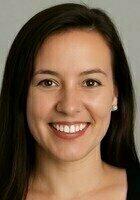
Kelsey
As a teacher and student alike, I value a life of education by inspiring and being inspired by the world, using my education and experiences to motivate positive change. My vision: to help students help themselves achieve and sustain success across the curriculum any time, any where. My core qualifications: Special Education, Reading Remediation, Curriculum Design, Common Core Standards and Modifications, Teaching 1:1 and Small Groups K-12, ODD, ADHD, ESL, Dyslexia/graphia, ASD, Power Yoga Instruction, Animal Assisted Education, Youth Mentoring, and StartupsProfessional Highlights:20 elementary and high middle school students successfully taught and mentored in 1st year of independent education startup12 Juveniles counseled and educated at a wilderness education program6 years successfully counseling "at risk" youth in California, Florida and Montana5 years tutoring and educating special populations across the curriculum4 years implementing animal assisted services and curriculum design3 years as a Certified Power Yoga Instructor for Corepower Yoga Studios2 years as a Certified TESOL/ESL Teacher for English: second language learners1 year as a Certified Choice Theory and Reality Therapy Educator for professionals, young adults and children6 months as a Volunteer TESOL educator for immigrant and refugee students
Q&A with Kelsey
Who needs tutoring?
No obligation. Takes ~1 minute.
Tutors with Similar Experience
Let's find your perfect tutor
Answer a few quick questions. We'll recommend the right plan and match you with a top 5% tutor.


